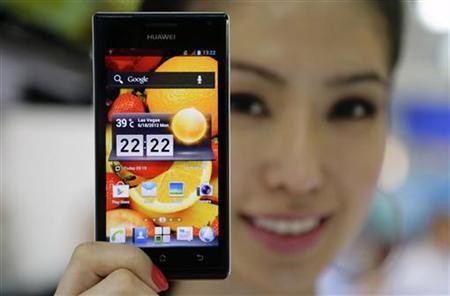Samsung Electronics Co. has been the globe's leading smartphone vendor over the past three years, but another fast-growing local vendor, Huawei Technologies, has now threatened its position.
Long popular as a telco-equipment maker to international carriers, Huawei has already snatched the throne from Samsung in China, the world's largest market, where 425 million smartphones are estimated to be shipped this year.
Data from IDC showed the Shenzhen-based firm as the third-largest smartphone manufacturer in the second quarter. This can be attributed to Huawei's expansion in Middle Eastern and African markets, where smartphone growth is higher than that of any other region.
Huawei's revenues went up 87 percent in the first half of the year, and the firm had hopes of challenging strong rivals Samsung and Apple Inc. in the smartphone industry.
"The best product and the best innovation are coming from Huawei. Not from Apple, not from Samsung," said Richard Yu, Huawei's chief executive for its consumer business unit.
As an attempt to be known beyond budget phones, Huawei started launching high-end models at more expensive prices. It introduced the Huawei Mate S, priced at 600 euros ($679), at the IFA consumer trade expo in Berlin. This new flagship smartphone model could aid Huawei in going up against Samsung. The two firms battle it out in the same price segments and both manufacture devices using Google Inc.'s Android operating system.
Samsung's international market share has been in a decline over the past year. Its competitor Huawei and other Chinese rivals have been trying to steal the limelight from the tech giant. The South Korean smartphone vendor's shipments went down 2.3 percent in the second quarter, with its global market share dropping from 25 percent to 22 percent, according to IDC.
Huawei, on the other hand, had seen a 48-percent increase in shipments compared to last year, resulting in an 8.9-percent market share and becoming the fastest-growing player among the top five worldwide manufacturers, IDC said.
Huawei's market share in the Middle East and Africa has expanded to more than quadruple in just two years, from 2.6 percent in the second quarter of 2013 to 11 percent in the second quarter of 2015, while Samsung's share dropped to 32 percent from 53 percent during the same period.
"With aggressive plans to expand in the region, especially in Africa, Huawei will continue to be a threat to Samsung," said IDC's research manager for the Middle East and Africa, Nabila Popal.
Ashraf Fawakherji, Huawei's Middle East head, together with this team, launched a Facebook campaign in 2013, asking people to record their voices as they pronounce "Huawei." Thousands of people participated for a chance to win free Huawei smartphones.
Huawei also hired famous Arab singer Nancy Ajram, and released an online campaign asking people to send their videos singing one of her songs. Finalists were given the chance to perform in front of the popular singer and the winner was awarded with $25,000 of solid gold.
Huawei has also penetrated European markets, where it has been sponsoring major soccer teams such as Spain's Atlético Madrid and Italy's AC Milan. The company's market share in the second quarter jumped from 6 percent to 10 percent, while its share in Italy surged to 9 percent from 7 percent, according to IDC data.
However, Samsung remains to be the leading smartphone vendor thanks to its well-established brands. It won't be easy for Huawei to topple down the South Korean tech giant, according to some analysts.
Last year, Samsung ranked seventh in Interbrand's 100 Best Global Brands list, while Huawei, the only Chinese firm on the ranking, was ranked 94th.
Huawei smartphones also have a weak presence in the U.S., where its telecom-networking-gear business has been effectively banned due to security issues raised by lawmakers who said Chinese devices could be used by Beijing for spying.
Huawei has declined the perspective that it could pose security threats, and has said that it would offer new phone models in the U.S., without sharing any details.
Yu is still confident that more consumers are getting to recognize the enhancements in Huawei's devices.
"Rome was not built in a day," he stated at the July briefing.



























